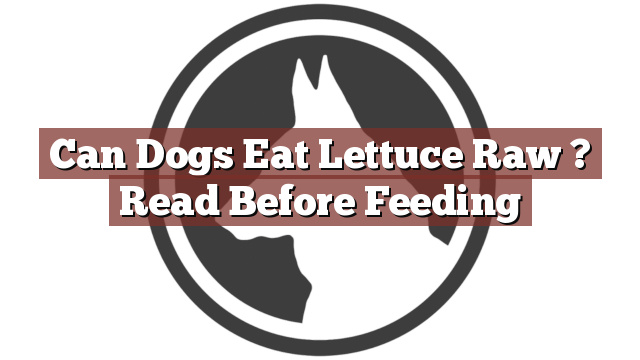Understanding Your Dog’s Dietary Needs
Just like humans, dogs have specific dietary needs that must be met in order for them to live a healthy and happy life. A well-balanced diet is essential to provide them with the necessary nutrients, vitamins, and minerals. While dogs are primarily carnivorous animals, they can still benefit from incorporating certain fruits and vegetables into their diet. However, it is important to note that not all human foods are safe for dogs to consume, as some can be harmful or even toxic to them.
Can Dogs Eat Lettuce Raw? Read Before Feeding
Can dogs eat lettuce raw? The answer is yes, dogs can eat lettuce raw. Lettuce is a leafy green vegetable that is low in calories and high in fiber, making it a healthy option to include in your dog’s diet. It is a good source of vitamins A and K, as well as folate. These vitamins help support your dog’s immune system, promote healthy digestion, and contribute to overall wellbeing. Additionally, lettuce can provide a satisfying crunch that can be enjoyable for your four-legged friend.
However, it is important to remember that lettuce should only be given to your dog in moderation. Feeding your dog too much lettuce can potentially cause digestive upset, such as diarrhea or gas. It is also important to thoroughly wash the lettuce and remove any excess dressing or seasoning before feeding it to your dog. Some dressings and seasonings can contain ingredients that are harmful to dogs, such as onions or garlic.
Pros and Cons of Feeding Lettuce to Dogs
Feeding lettuce to your dog can have several benefits. As mentioned earlier, lettuce is low in calories and high in fiber, which can be beneficial for dogs that need to maintain a healthy weight. The high fiber content can also aid in digestion and promote regular bowel movements. Additionally, lettuce can provide a source of hydration, as it has a high water content.
However, there are also some considerations to keep in mind when feeding lettuce to your dog. Some dogs may have a difficult time digesting lettuce, which can lead to gastrointestinal discomfort. Additionally, if your dog has any underlying health conditions or dietary restrictions, it is always best to consult with your veterinarian before introducing any new foods into their diet.
Conclusion: Considerations for Including Lettuce in Your Dog’s Diet
In conclusion, yes, dogs can eat lettuce raw. Lettuce can be a healthy addition to your dog’s diet, providing them with vitamins, minerals, and fiber. However, it is important to feed lettuce to your dog in moderation and ensure that it is properly washed and free from any harmful ingredients. As with any dietary changes, it is always best to consult with your veterinarian to ensure that lettuce is a suitable addition to your dog’s specific needs and health conditions. By considering your dog’s dietary needs and following proper guidelines, you can safely incorporate lettuce into their diet and provide them with a well-rounded and nutritious meal plan.
Thank you for taking the time to read through our exploration of [page_title]. As every dog lover knows, our furry friends have unique dietary needs and responses, often varying from one canine to another. This is why it's paramount to approach any changes in their diet with caution and knowledge.
Before introducing any new treats or making alterations to your dog's diet based on our insights, it's crucial to consult with a veterinarian about [page_title]. Their expertise ensures that the choices you make are well-suited to your particular pet's health and well-being.
Even seemingly harmless foods can sometimes lead to allergic reactions or digestive issues, which is why monitoring your dog after introducing any new food item is essential.
The content provided here on [page_title] is crafted with care, thorough research, and a genuine love for dogs. Nevertheless, it serves as a general guideline and should not be considered a substitute for professional veterinary advice.
Always prioritize the expert insights of your veterinarian, and remember that the health and happiness of your furry companion come first.
May your journey with your pet continue to be filled with joy, love, and safe culinary adventures. Happy reading, and even happier snacking for your canine friend!

